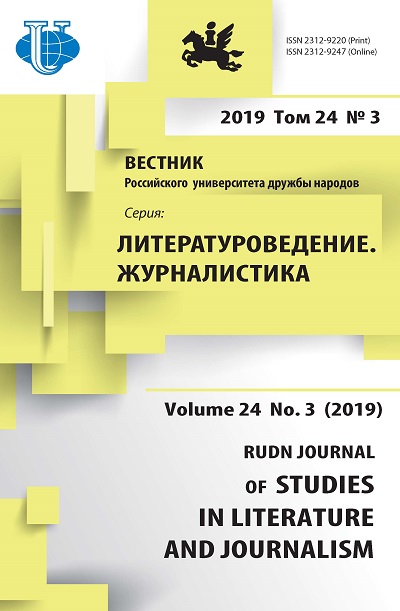Восприятие работ В. Шкловского в Китае
- Авторы: Лю М.1, Кольцова Н.З.1
-
Учреждения:
- Московский государственный университет имени М.В. Ломоносова
- Выпуск: Том 24, № 3 (2019)
- Страницы: 462-476
- Раздел: Компаративистика
- URL: https://journals.rudn.ru/literary-criticism/article/view/22341
- DOI: https://doi.org/10.22363/2312-9220-2019-24-3-462-476
- ID: 22341
Цитировать
Полный текст
Аннотация
В статье рассматривается история распространения и восприятия в Китае произведений и идей Виктора Шкловского с 1930-х по 2010-е годы, дается краткий обзор научных статей китайских русистов, сыгравших ключевую роль в изучении наследия писателя, освещается процесс формирования формалистского понятийного аппарата в китайском литературоведении. Особое внимание уделено категории остранения, прочно вошедшей в китайское литературоведение и широко использующейся при анализе произведений китайской литературы и кинематографа, рассматриваются такие понятия русского формализма, как литературность, прием, уже с начала восьмидесятых годов ХХ века принятые наукой Китая. В статье подчеркивается, что история восприятия теоретических воззрений В. Шкловского в Китае включает в себя несколько этапов, при этом подлинное изучение его работ, как и русского формализма в целом, начинается лишь в 1980-е годы ХХ века. Художественным произведениям Шкловского в Китае стали уделять внимание только XXI веке.
Ключевые слова
Об авторах
Мяовэнь Лю
Московский государственный университет имени М.В. Ломоносова
Автор, ответственный за переписку.
Email: miaowenliu@mail.ru
аспирант кафедры истории новейшей русской литературы и современного литературного процесса филологического факультета Московского государственного университета имени М.В. Ломоносова
Российская Федерация, 119991, Москва, Ленинские горы, 1Наталья Зиновьевна Кольцова
Московский государственный университет имени М.В. Ломоносова
Email: koltsovaru@rambler.ru
кандидат филологических наук, доцент кафедры истории новейшей русской литературы и современного литературного процесса Московского государственного университета имени М.В. Ломоносова
Российская Федерация, 119991, Москва, Ленинские горы, 1Список литературы
- Ду Фу. Проект Наталии Азаровой. М.: ОГИ, 2012. 296 с.
- Эрлих В. Русский формализм. СПб.: Академический проект, 1996. 351 c.
- Якобсон Р.О. Новейшая русская поэзия [1921] // Якобсон Р.О. Работы по поэтике. М.: Прогресс, 1987.
- Ди Гочи. Остранение и время: две основные концепции поздних литературных мыслей В. Шкловского // Вестник Хуанхэского научно-технологического университета. 2002. № 4. С. 66-71. [丁国旗 奇异化与时间:什克洛夫斯基晚期思想中的 两个重要概念。黄河科技大学学报,2002年。第4期,第66-71页。]
- Фан Шань. Теория литературы формализма. Зинань: Шандунское воспитательное издательство, 1999. 319 с. [方珊 形式主义文论。济南:山东教育出版社。1999 年。319页。]
- Ли Фангуй. Теория формализма в раннем советском литературоведении // Советская литература. 1983. № 4. С. 80-86. [李凡辉 早期苏联文艺学界的形式主义理 论。苏联文学,1983年,第四期。第80-86页。]
- Цянь Цзяожу. Литературность и остранение: две теоретические опоры раннего русского формализма // Критика иностранной литературы. 1989. № 1. С. 26-32. [钱佼汝 陌生化和文学性:俄国形式主义早期两大理论支柱。外国文学评论, 1989年,第1期,26-30页。]
- Цянь Чжуншу. Записки о литературе и культуре. Шайхай: Китайское книгоиздательство, 1984. 706 с. [钱钟书 谈艺录。上海:中华书局。1984。706页。]
- Тао Дунфон. Взгляд русского формализма на историю литературы // Критика иностранной литературы. 1991. № 3. С. 97-104. [陶东风 俄国形式主义的文学史观。 外国文学评论,1992年,第三期,97-104页。]
- Ван Цзечжи. Восприятие русского формализма в Китае // Китайское сравнительное литературоведение. 2005. № 3. С. 169-180. [汪介之 俄国形式主义在中国的接 受。中国比较文学,2005年,第三期,169-180页。]
- Чжан Бин. Поэтика остранения: исследования русского формализма. Пекин: Издво Пекинского педагогического университета, 1999. 324 c. [张冰 陌生化诗学:俄 国形式主义研究。 北京:北京师范大学出版社,1999年。 324页。]
- Чжан Бин. Остранение и монтаж: критическое обозрение эстетики русского формализма // Русская литература и искусство. 2013. № 2. С. 144-150. [张冰 陌生 化与蒙太奇:俄国形式主义电影美学述评。俄罗斯文艺,2013年,第二期。第 144-150页。]
- Чжан Бин. Эстетика различия Цянь Чжуншу и ОПОЯЗа: о пути сравнительного литературоведения // Вестник Китайского университета политики и права. 2013. № 2. С. 138-147. [张冰 钱钟书与奥波亚兹的差异论美学:兼论文学比较入思的路 径与方式。 中国政法大学学报,2013年,第二期。第138-147页。]
Дополнительные файлы















